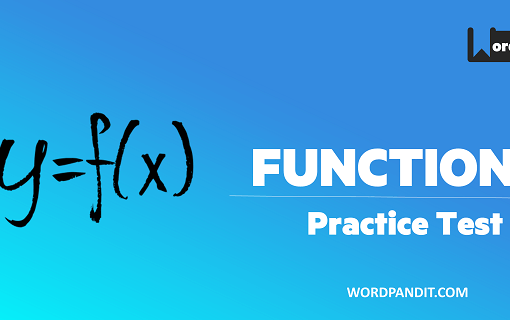- This is an assessment test.
- To draw maximum benefit, study the concepts for the topic concerned.
- Kindly take the tests in this series with a pre-defined schedule.
Algebra: Functions Test-4
Congratulations - you have completed Algebra: Functions Test-4.You scored %%SCORE%% out of %%TOTAL%%.You correct answer percentage: %%PERCENTAGE%% .Your performance has been rated as %%RATING%%
Your answers are highlighted below.
Question 1 |
The following functions have been defined:
$ \displaystyle \begin{array}{l}la\,\,\left( x,y,z \right)\,=\min \,\left( x+y,y+z \right)\\le\,\,\left( x,y,z \right)\,=\max \,\left( x-y,y-z \right)\\ma\,\,\left( x,y,z \right)\,=\left( 1/2 \right)\,\left[ le\,\left( x,y,z \right)+la\,\left( x,y,z \right) \right]\end{array}$
For x = 15, y = 10 and z = 9, find the value of : le (x, min (y,x - z), le (9, 8, ma (x, y, z)))
For x = 15, y = 10 and z = 9, find the value of : le (x, min (y,x - z), le (9, 8, ma (x, y, z)))
5 | |
12 | |
9 | |
4 |
Question 1 Explanation:
Segregating and simplifying,
ma (15, 10, 9)= 1/2 [{le (15,10,9)}+(la (15,10,9)}]
=1/2 [{max (5,1)}+(min (25,19)}]
=1/2 [5+19]
=12
le (x, min (y,x - z), le (9, 8, 12))
= le (15, min (10,6), le (9, 8, 12))
= le (15, 6, max(1,-4))
= le (15, 6,1)
= max (9,5)
= 9
ma (15, 10, 9)= 1/2 [{le (15,10,9)}+(la (15,10,9)}]
=1/2 [{max (5,1)}+(min (25,19)}]
=1/2 [5+19]
=12
le (x, min (y,x - z), le (9, 8, 12))
= le (15, min (10,6), le (9, 8, 12))
= le (15, 6, max(1,-4))
= le (15, 6,1)
= max (9,5)
= 9
Question 2 |
The following operations are defined for real numbers a # b = a + b if a and b both are positive else a # b = 1 .a∇b = (ab)a+ b if ab is positive else a∇b = 1.
(2 # 1)/(1∇2) =
1/8 | |
1 | |
3/8 | |
3 |
Question 2 Explanation:
Segregating and simplifying,
(1∇2)
= (1 x 2)1+ 2 , since both are positive.
= (2)3
=8 .
2#1= 2+1 , since both are positive.
=3
Therefore the value of the given expression is 3/8.
(1∇2)
= (1 x 2)1+ 2 , since both are positive.
= (2)3
=8 .
2#1= 2+1 , since both are positive.
=3
Therefore the value of the given expression is 3/8.
Question 3 |
The following operations are defined for real numbers a # b = a + b if a and b both are positive else a # b = 1 .a∇b = (ab)<sup>a+ b</sup> if ab is positive else a∇b = 1.
{((I # 1) # 2) - (10<sup>1.3</sup> ∇log<sub>10</sub> 0·1)}/(1∇2) =
3/8 | |
4log100·1/8 | |
(4+101.3)/8 | |
None of these |
Question 3 Explanation:
Segregating and simplifying,
{((I # 1) # 2) - (101.3 ∇log10 0·1)}/(1∇2)
={((I # 1) # 2) - (101.3 ∇log10 0·1)}/(8)
={((I # 1) # 2) - (101.3 ∇-1)}/(8)
={((I # 1) # 2) - 1}/(8)
={(2 # 2) - 1}/(8)
={4 - 1}/(8)
=3/8
{((I # 1) # 2) - (101.3 ∇log10 0·1)}/(1∇2)
={((I # 1) # 2) - (101.3 ∇log10 0·1)}/(8)
={((I # 1) # 2) - (101.3 ∇-1)}/(8)
={((I # 1) # 2) - 1}/(8)
={(2 # 2) - 1}/(8)
={4 - 1}/(8)
=3/8
Question 4 |
The following operations are defined for real numbers a # b = a + b if a and b both are positive else a # b = 1 .a∇b = (ab)<sup>a+ b</sup> if ab is positive else a∇b = 1.
. ((X # - Y)/(- X∇Y)) =3/8, then which of the following must be true ?
X = 2, Y= 1 | |
X> 0, Y< 0 | |
X, Y both positive | |
X, Y both negative |
Question 4 Explanation:
Checking by options:
a) doesn't satisfy. Incorrect option
b) Absolutely possible since for no real value of x denominator would be able to take 8/3 as
it is expressed as (ab)a+b but x+y can take a positive value 3/8 if both are
positive which can happen only when y <0. Correct option. Checking other.
c) X, Y both positive , doesn’t satisfy. Incorrect option
d) X, Y both negative. Then both numerator and denominator is 1.
a) doesn't satisfy. Incorrect option
b) Absolutely possible since for no real value of x denominator would be able to take 8/3 as
it is expressed as (ab)a+b but x+y can take a positive value 3/8 if both are
positive which can happen only when y <0. Correct option. Checking other.
c) X, Y both positive , doesn’t satisfy. Incorrect option
d) X, Y both negative. Then both numerator and denominator is 1.
Question 5 |
If x and yare real numbers, the functions are defined as f(x, y) = I x + Y I, F (x, y) = - f (x, y) and G (x, y) = - F (x, y). Now with the help of this information answer the following questions:
Which of the following will be necessarily true
G( f(x, y), F (x, y))> F (f(x, y), G (x, y)) | |
F (F (x, y), F (x, y)) = F (G (x, y), G (x, y)) | |
F (G (x, y), (x + y) ≠ G (F (x, y), (x - y))) | |
f (f(x, y), F (x - y)) = G (F (x, y),f (x - y)) |
Question 5 Explanation:
Take some values of x and y and put in the given expression find which satisfies the answer choices.
Going by option elimination.
(a) will be invalid when$ \displaystyle x+y=0$
(b) is the correct option as both sides $ \displaystyle -2\,\left| \,\,x+y\,\,\, \right|$as the result.
(c) will be equal when$ \displaystyle \left( x+y \right)=0$
(d) is not necessarily equal (plug values and check)
Once you are finished, click the button below. Any items you have not completed will be marked incorrect.
There are 5 questions to complete.
List |













